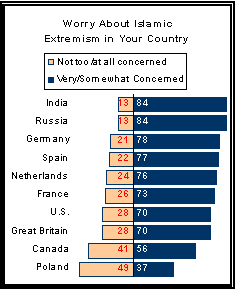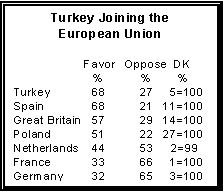Public attitudes toward Muslims and concerns over Islamic extremism are remarkably consistent in Western Europe, the U.S., and other countries with sizeable Muslim minorities. Majorities in all Western European countries as well as Canada, India and Russia agree that Muslims coming to their countries want to be distinct from the larger country instead of adopting its customs and way of life.
In several of these countries, two-thirds or more take that view, with Germany leading the list (88% agree). In France, nearly six-in-ten (59%) see a desire for distinctness while 36% say that Muslims there want to adopt French customs. Americans are somewhat less likely to take this view; a 49% plurality thinks Muslims in the U.S. want to be distinct from the larger American society.
Large majorities in all of these countries, except Russia and Poland, feel that resident Muslims have at least a fairly strong sense of Islamic identity. About two-thirds in the United States (65%) and Canada (66%) view resident Muslims as having a very or fairly strong sense of Islamic identity. Even larger majorities take this view in Western Europe. The Dutch have the highest level of consensus on this point, with 86% seeing Muslims residing in the Netherlands as having at least a fairly strong sense of Islamic identity. Similarly, in India, with its substantial Muslim minority, 77% take this view.

Further, substantial majorities across Western Europe see resident Muslims’ sense of identity as growing — and those who do see this as a negative development. Better than three-quarters of the publics in France, Germany, the Netherlands, and Spain view the growing sense of identity among resident Muslims as a bad thing for their country. In Great Britain and Eastern Europe, smaller majorities agree. In North America, 50% in the U.S. and 51% in Canada perceive a growing sense of Islamic identity; on balance, both publics see this as a bad thing for their respective countries, though sizable minorities disagree.
The concerns people express over this growing sense of Islamic identity are more varied. Majorities in India, Russia and France, as well as pluralities in the U.S., Spain and Poland, cite the fear that it can lead to violence as their primary concern. In Great Britain, Canada, Germany and the Netherlands, the top worry was that greater Islamic identity would impede Muslim integration into the larger society (all surveys were conducted prior to the July terrorist attacks in London).
Concerns Over Islamic Extremism: Local and Global

The rise of Islamic extremism in their own countries is seen as worrisome by large majorities throughout Western Europe as well as the U.S., Canada, India and Russia. Most concerned are the publics in Russia and India, where 52% and 48%, respectively, say they are very concerned. In Canada, concern is somewhat less intense with 56% being at least somewhat concerned about extremism there, while in Poland just 37% are somewhat or very concerned about this.
Worry about the rise of Islamic extremism around the world is even more intense with substantial majorities in each of these non-Muslim countries expressing some measure of concern. Nine-in-ten in the Netherlands, and nearly as many elsewhere in Western Europe, are somewhat or very concerned about the global rise of Islamic extremism. A narrow majority in Russia (51%) and pluralities elsewhere in Europe are very concerned about this.
Opinion on Turkey Joining the EU

The concerns over Islamic extremism are reflected in European opinions about Turkey’s bid to join the European Union. However, attitudes toward immigration are even more strongly associated with views about Turkey’s admission to the EU.
The Turkish public strongly endorses membership (68%). An equally large majority in Spain (68%) also favors Turkey’s admission, as do 57% in Great Britain and 51% in Poland. Elsewhere in Europe, however, majorities oppose allowing Turkey to join the EU: 66% in France, including 30% who strongly oppose; 65% in Germany; and 53% in the Netherlands.

Attitudes toward immigration are associated with these views. Those who consider immigration (from the Middle East and North Africa, or from Eastern Europe) to be a bad thing are more likely to oppose Turkey’s membership into the European Union. This pattern is particularly strong in the Netherlands, France and Germany. Similarly, those who are more concerned about Islamic extremism in their homeland are more likely to oppose having Turkey join the E.U., especially in Germany, France, and the Netherlands, but less strongly elsewhere.
Voices
Reporting by the International Herald Tribune*
“I’m not surprised at all that so many people are worried about rising extremism. We all saw what happened in London… What if Paris is next? Now when I take the metro I am actually a bit worried. I’m afraid, but I’m also annoyed because some of the Muslims in France are becoming very feisty. Like when they whistled and booed during the Marseillaise during a football match between France and Algeria last year. They’re in our country because they don’t want to be in their own, but they criticize France and more and more of the young ones are now parading their Muslim identity.” – A 23-year-old newspaper vendor in Paris
“Who are the Muslims? In the economic sphere, they are integrated. I think a recognizable part of the Muslim people want to be distinct. The question is wrong because there are many different kinds of Muslims. My friend has married a Muslim from Syria. She can still wear a short skirt. And her mother-in-law does not wear a head scarf… As for the immigration issue, it depends who is coming. Many are not qualified. They think there is a better life here. They will be looked after. They have to be fed. The fear is not just that many Turks will come to Germany if Turkey joins the EU. It’s something else as well. The liberals feel that their liberal values will be undermined.” – A piano teacher in Berlin
“Certainly since Sept. 11 there is a growing emphasis among Muslims on faith, also among young people. There is a growing distance between them and the rest of Dutch society… The most orthodox Muslims tell their fellow believers: Either you are a good Muslim and keep your distance from the Dutch ways, or you integrate and corrupt your faith. There is a large group of Muslims that does not agree with this view… So people wonder if it is possible to be a Dutch Muslim. The most orthodox preachers and believers want a cohesive Muslim community which they can control.” – A sociology professor in Amsterdam.
“Muslims in France are seen as people who want to impose their religion on others. It’s true that their search for an identity seems to have become a lot more pronounced, especially in the younger generations. Sometimes it annoys me, too. When I go to Sri Lanka and visit a temple I have to put on a veil. Why don’t they adapt to our culture here?” – A 34-year-old immigration researcher at a Paris institute
“You cannot separate the issue of Turkey from domestic politics. There is a very important trend emerging and we see this in the Netherlands. The liberal-thinking people… have a feeling that the Muslim identity combined with Turkish accession to the EU is putting into danger what the EU has achieved in the societies…that the sexual/gender issues, the honor killings, the head scarves, these could become the lifestyles if it continues like this.” – A European Union Parliamentarian born in Germany of Turkish parents
*Interviews were conducted by Katrin Bennhold in France, Judy Dempsey in Germany, Salman Masood in Pakistan, Evelyn Rusli in Indonesia and Marlise Simons in the Netherlands, all of the International Herald Tribune and Mayssam Zaaroura in Lebanon of The Daily Star.




